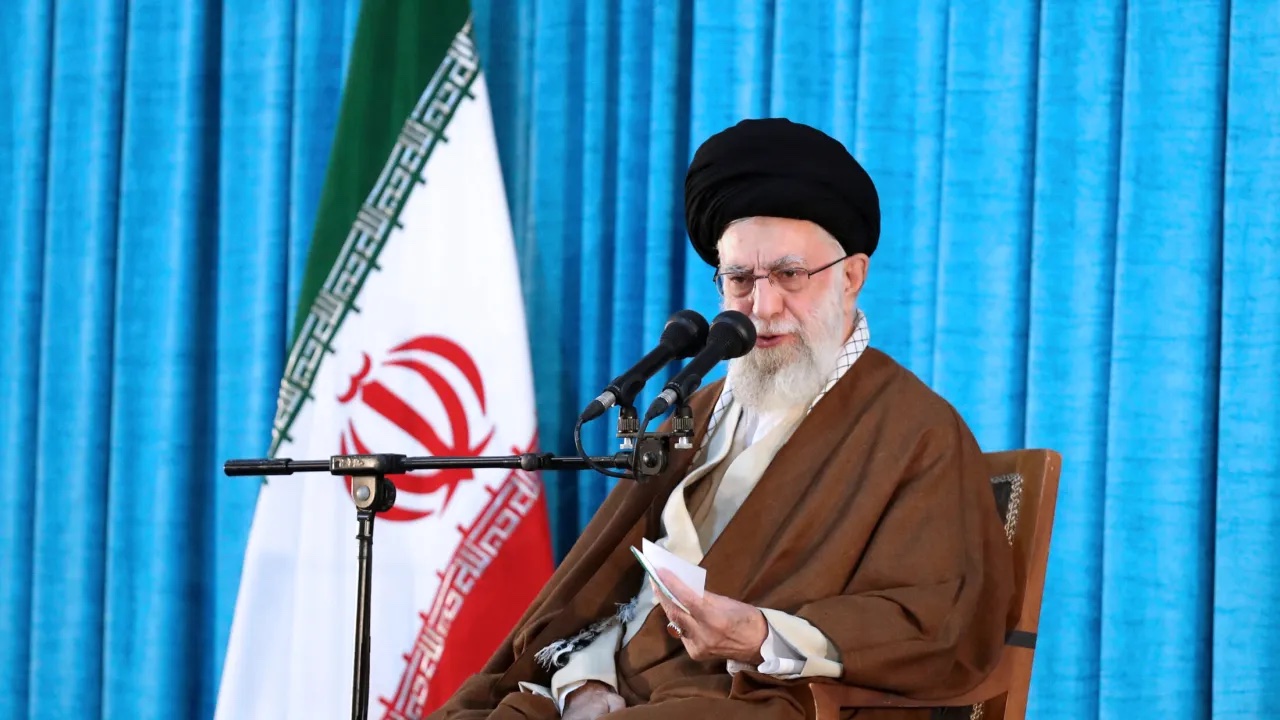In this picture released by the official website of the office of the Iranian supreme leader, Supreme Leader Ayatollah Ali Khamenei speaks during a ceremony commemorating the death anniversary of the late revolutionary founder Ayatollah Khomeini at his mausoleum just outside Tehran, Iran, Sunday, June 4, 2023. (Office of the Iranian Supreme Leader via AP)
| This article appeared in The Hill on 8/18/23 Are American national security interests served by the release of billions of dollars of Iranian funds frozen by U.S. sanctions under the Trump administration? According to Secretary of State Antony Blinken, “Iran will not be receiving any sanctions relief…We will continue to enforce all of our sanctions.”How can we make sense of those statements? If you release the very funds frozen by sanctions, isn’t that “sanctions relief” by definition? What the world sees is the U.S. capitulating to the demands of the Ayatollah in a quid-pro-quo deal. They release four American hostages, and in exchange we release Iranian assets held in South Korea, and possibly much more in the near future from frozen Iraqi purchases of Iranian electricity. As the Wall Street Journal points out, those funds were held because the previous administration “tightened sanctions” on Iran’s oil exports. Again, the operative word is “sanctions.” As part of this unwritten deal, reminiscent of undisclosed verbal promises given to Iran during former President Barack Obama’s 2015 nuclear deal, the Iranians supposedly promised not to attack U.S. soldiers in Syria and Iraq. What lesson will the international community learn from that — the U.S. paying extortion money to Iran not to attack our soldiers? This deal is similar to when the Obama administration claimed the $1.7 billion in cash that it sent to the Iranians in 2016 for the release of four American hostages was somehow not what it obviously seemed to be — a ransom payment. That payment was universally perceived to be a payoff to a brutal regime, humiliating America and sending a message worldwide of American fecklessness and lack of resolve. The broader question is this: How can we expect nations like Turkey, India, and others in Europe to enforce American secondary sanctions against Russia, Iran, and China, forgoing their own economic interests, when Biden and Blinken act so flagrantly to undermine our own sanctions? For reference, “primary” sanctions prohibit U.S. citizens and companies from investing or dealing with American-sanctioned nations or individuals, as in U.S. government sanctions against Iran and Russia. “Secondary” sanctions try to compel non-U.S. citizens and countries to stop business and other activities with U.S.-sanctioned countries or else risk losing access to American markets. For America’s primary sanctions against adversaries to work, its allies must enforce the secondary sanctions, which pose a simple choice of doing business with either the U.S. or the sanctioned nation. But how can the Biden administration get upset when much of the world evades or ignores American secondary sanctions on Iran, Russia, or China, considering that America picks and chooses which of its own sanctions to enforce? Some claim that sanctions don’t work, but their failure is usually a function of lack of enforcement. The Obama administration, despite claiming to be pro-sanctions, was notorious for selectively enforcing primary and secondary sanctions against Iran. This culminated in a poorly negotiated nuclear whereby America undermined much of its own leverage, acquiescing to Iran’s demand to enrich uranium. The administration’s claim that the billions in unfrozen funds in South Korea this time will only be used by Iran for humanitarian purposes is not credible. Everyone knows that money is fungible. Iran’s regime has for decades put the arming of its military and proxy militias ahead of anything “humanitarian” for Iranians or anybody else. Indeed, some in Iran openly dispute that there are even conditions on how the money is to be spent. They claim “that Tehran will have total control over the funds” in this deal. Karim Sadjadpour at the Carnegie Endowment for International Peace said, “This deal will reinforce the view of (Iran’s) Revolutionary Guards that hostage-taking is a lucrative practice with minimal costs.” Is cozying up to the Ayatollah with cash a precursor for a secret nuclear deal between the Biden administration and Iran, away from the eyes of Congress? Is this Biden’s plan to kick the nuclear can down the road past the 2024 election? Iran may already be taking steps to limit the amount of its enriched uranium. Haaretz reported an unwritten deal between Biden and Iran, “according to which Iran has committed not to enrich uranium above a level of 60 percent in exchange for the release of Iranian assets worth $20 billion, had started being implemented.” However, limiting uranium to 60 percent shouldn’t fool anyone, as Iran can enrich that to 90 percent weapons grade in a few weeks’ time. This is the same Iran that runs a police state subjugating its citizens, sends drones to Russia to hit civilian targets in Ukraine, and commandeers oil tankers in the Persian Gulf to show it can strangle the world’s most strategic fossil fuel transit route. Iran’s release of illegally imprisoned hostages is something we all can celebrate on a human level. However, from an American national security perspective, it only encourages more kidnapping of U.S. citizens, while funding Iranian-controlled terrorists who will use the funds to escalate their expansionism into the Levant. It weakens American diplomacy for the future and makes it more challenging to get nations to endure economic hardship by participating in our secondary sanctions. Eric R. Mandel is director of the Middle East Political Information Network and Mandel Strategies and the Senior Security Editor for the Jerusalem Report. |
